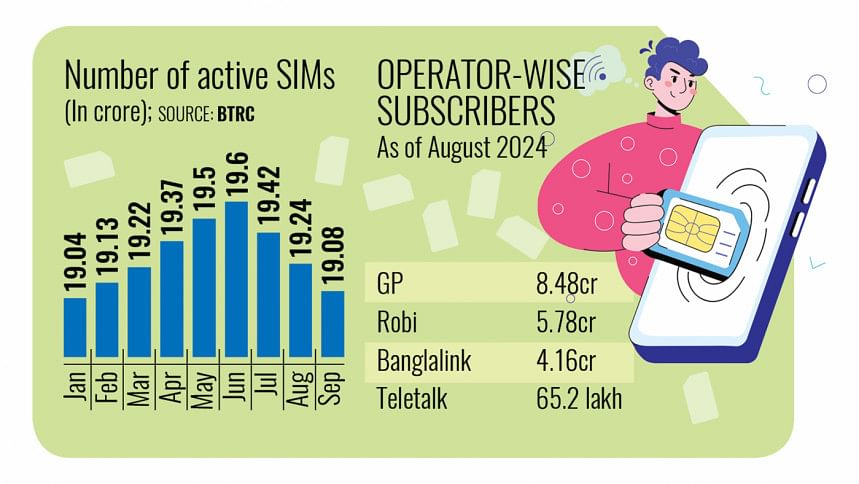Tax hike dents mobile subscriber base

The mobile subscriber base in Bangladesh dropped by over 52 lakh between July and September, the first three months of the current fiscal year, as operators slashed subsidised sales of SIM cards due to increased taxes.
In this year's national budget, the government raised the value-added tax (VAT) on SIM cards by 50 percent, hiking it from Tk 200 to Tk 300.
Mobile network operators cited this increase as the major reason for what they identified as the biggest decline in a single quarter in recent memory.
Grameenphone, Robi, Banglalink, and Teletalk collectively lost about 16.3 lakh customers in September alone, before shedding about 36 lakh subscribers in July and August.
This reduced the total subscriber base to 19.08 crore. The overall number of mobile subscribers is calculated based on the purchase of new SIMs minus the number of SIMs rendered invalid after being left unused for more than one and a half years.
Officials of mobile network operators said they typically bear the lion's share of taxes on SIM cards, often providing them free of charge.
However, with the increase in taxes, smaller local market players like Banglalink and Robi are struggling to continue subsidising SIM cards, unlike larger ones like Grameenphone, which have greater financial resources.
"We have seen the number of subscribers decreasing over the past few months. I believe this is happening for a couple of reasons," said Taimur Rahman, chief corporate and regulatory affairs officer at Banglalink.
"First, due to the current economic situation, the number of new customers joining or returning to the network has declined. Another reason is the increased SIM card tax, which now makes it very difficult for mobile operators to subsidise SIM cards as heavily as they did in the past.
"This issue is even more challenging for smaller operators. Larger players are still able to offer greater subsidies, which creates a competitive imbalance in the market," he added.
Banglalink alone lost about 8 lakh customers in September following a drop of 18 lakh customers in July and August, shrinking its subscriber base to 4.16 crore.
This represents a decline of 0.84 percent month-on-month, 2.85 percent quarter-on-quarter for the July-September period, and 1.22 percent year-on-year for the operator.
Robi's subscriber base also came down to 5.79 crore after it lost about 5 lakh customers in September and a combined 12 lakh in July and August.
This represents a decline of 0.48 percent month-on-month and 1.63 percent quarter-on-quarter for the July-September period. However, on a year-on-year basis, it witnessed 0.26 percent growth in September.
Shahed Alam, chief corporate and regulatory officer at Robi Axiata, said smaller operators are unable to offer the same level of subsidies as before due to the tax hike.
"Moreover, the internet shutdown in July and August adversely affected smaller operators due to the multi-SIM scenario."
The Awami League, which was ousted by a mass uprising on August 5, had imposed nationwide internet blackouts in phases to subdue protesting students.
Alam added that a considerable number of users did not reactivate their SIMs following the internet shutdown, further exacerbating the challenges faced by the sector.
Grameenphone, the country's top operator, lost 2.5 lakh customers in September and 5.5 lakh combined in July and August, bringing its customer base to 8.48 crore.
This represents a decline of 0.25 percent month-on-month and 0.70 percent quarter-on-quarter. However, it maintained a 2.61 percent year-on-year growth in September.
State-owned Teletalk lost about 10,000 customers, taking its total customer base to 65.2 lakh in September.
This represents a decline of 0.01 percent month-on-month and 0.52 percent quarter-on-quarter. However, it maintained 1.73 percent year-on-year growth in September.

 For all latest news, follow The Daily Star's Google News channel.
For all latest news, follow The Daily Star's Google News channel. 



Comments